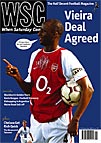 Paul Ashley-Jones explains why TNS will be a force to be reckoned with in the Welsh Premier next season
Paul Ashley-Jones explains why TNS will be a force to be reckoned with in the Welsh Premier next season
When this year’s UEFA Cup draw was made, there cannot have been any greater sense of anticlimax than that felt by Manchester City when they were drawn against Total Network Solutions. Still, at least it should mean a straightforward passage into the next round for Kevin Keegan’s team, with no one really expecting an upset against a team based in Llansantffraid, a mid-Wales village of under 1,000 people. No one, that is, except Mike Harris, chairman and owner of TNS Football Club, who has gone on record as expressing his condolences to City for the fact that their long-awaited European adventure is to finish so soon. This is the same Mike Harris who has predicted his TNS side will become the second largest team in Wales, behind only Cardiff City, within five years.